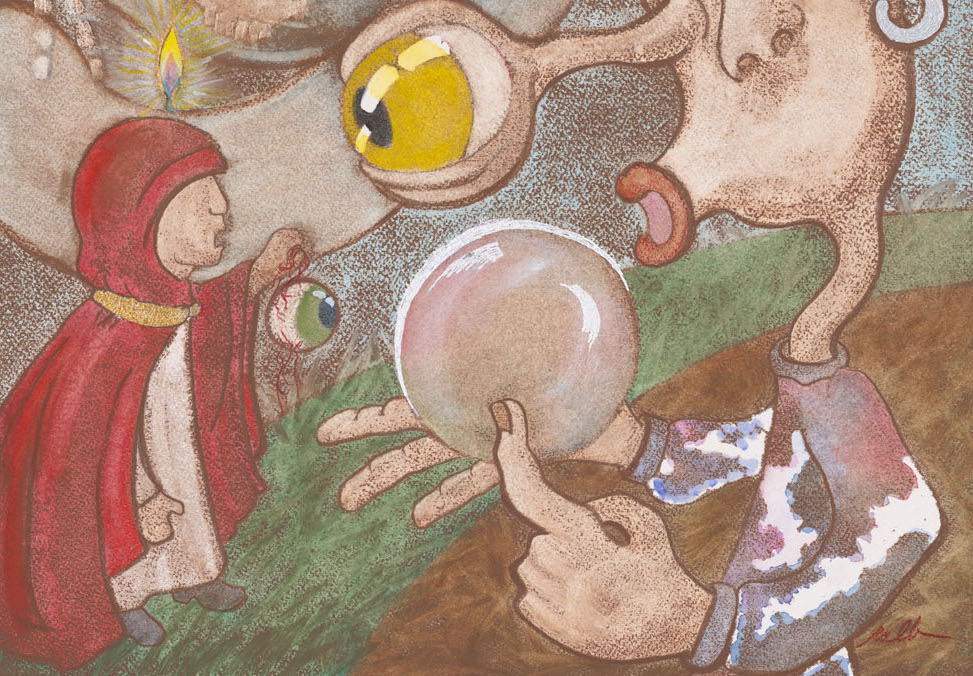|
|
| Oct/Nov 2017 • Nonfiction |
|
|
| Oct/Nov 2017 • Nonfiction |

Image excerpted from Dead Don't Mean Right by Roe LiBretto
1. Interview tactics
Smile. Open your face like a butterfly. Show your clean, immutable hands, one side then the other. Lean close. Spoon-feed sweet questions. Hide the barbed ones under the table.
2. Quotation marks
Your pockets are full of metal commas you can throw, flip, and otherwise deploy. Scatter them like seeds. Place them like stones. Make a circle, stand inside, point outside.
You're safe, you see?
3. Illusion of innocence
My journalism prof didn't like it when I applied the copycat theory to school shootings. He disagreed that front-page AK-47 selfies could be inspiring. We were supposed to question our role but not criticize it. To sense our power but not know it. If there are any doubts left over, try draft beer, have sex with your colleagues, run a marathon.
It was difficult to say no to our editors when we were young and seeking. Inconveniently, that was also when we had beliefs. But late at night or early in the morning, we found ourselves wondering whether they were our real beliefs or beliefs we'd dreamed about having or beliefs held by characters in books that were not us, and in our confusion they became easier to set aside.
Once I wrote about my mother's hometown, a small place grieving a widespread loss of employment and fearful of its future. A town councillor/hairdresser remembered being sent as a child to my grandfather's butcher shop (my grandfather, a collection of stories in my heart). “Do you have any dog bones?” she'd asked him. He'd considered this, theatrically. “Nope,” he said. “Haven't killed any dogs lately.” Little girl, horrified. I placed that story in my left chamber, beside his April Fool's Day tricks.
An expert asked, do all towns have a right to exist, or should we let some of them die? My editor made it a headline, but my name was on the story.
4. Corrections and clarifications
Due to a typing error, Saturday's story on local artist Jon Henninger mistakenly reported that Henninger's bandmate Eric Lyday was on drugs. The story should have read that Lyday was on drums. The SENTINAL regrets the error.
By unfortunate error we referred to Rachel Garley, the late Sebastian Horsley's girlfriend, as a prostitute. We accept that Ms. Garley is not and has never been a prostitute. We offer our sincere apologies to Ms. Garley for the damage to her reputation and the distress and embarrassment she has suffered as a result.
An Oct. 2 article incorrectly stated that David Dewees, 32, of Toronto, was charged with sexually assaulting two 13-year-old boys. In fact, Dewees, a teacher at Jarvis Collegiate Institute, was charged with two counts of invitation to sexual touching and two counts of luring in connection with Internet contact with two boys, ages 15 and 16.
5. Occupational hazards
I read somewhere that sleep-maintenance insomnia—the kind where you sleep for four hours and spend the rest of the night on the couch watching '90s sitcoms—was a sign of depression. I thought it was a sign that 380,000 copies of a certain newspaper were spreading across the city in the dark, and that somewhere within those pages were words I had collected from others and given shape to, and that I was not, fundamentally, comfortable with the power I had to celebrate or complicate or destroy.
6. Journalism in the 21st century: a round table
i) How can the mainstream media harness the growing power of social media?
ii) Should we forbid staff from tweeting their opinions? About matters of public interest? About the new Caplansky's Deli at the airport?
iii) Is it still an interview if it happens over email?
iv) Is the reorganization of editorial staff into “content creators” and “content managers” improving productivity?
v) Who should we lay off next?
7. Other
On Oct. 3, David Dewees climbed onto the High Park subway tracks and waited for the train.
8. Alternative story formats
Be a teacher. Be a therapist. Be a poet. Be a barista. Be a communications professional. Be a physicist. Be a maker of quilts. Be nothing.
9. Truth
There are people who choose not to participate in society. Off-gridders. Ancient tribes. Certain kinds of stay-at-home moms.
But every breath releases carbon dioxide into the air. Every step leaves a mark on the earth, on a linoleum floor. And every utterance, hard or soft, will land somewhere on an ear.